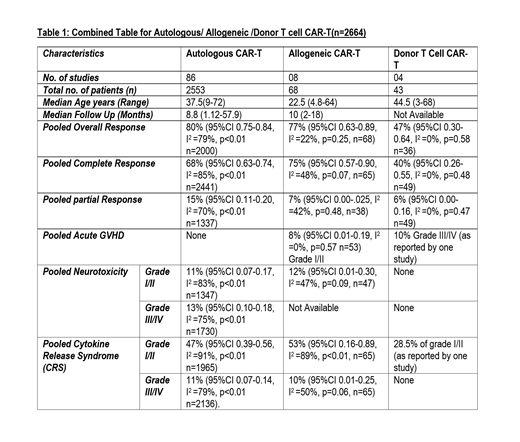Abstract
Introduction
Chimeric antigen receptor T cell (CAR-T) therapy is an adoptive immunotherapy employing genetically modified T cells. Autologous CD19 CAR-T cell therapy is currently approved for adults with relapsed or refractory non-Hodgkin lymphoma (NHL) and children and young adults (<26yo) with relapsed or refractory acute lymphoblastic leukemia (ALL), dramatically improving outcomes for these diseases. "Off the shelf" allogeneic CAR-T cells derived from the third party healthy donors may overcome several barriers to autologous CAR-T cells, including increased fitness of the construct's T-cells, and reducing therapy delays or failures resulting from manufacturing issues. However, allogeneic CAR-T cells may come with added risks such as graft versus host disease (GvHD) and increased rates of donor rejection. We performed a systematic review and meta-analysis to assess and compare the safety and efficacy of allogeneic versus autologous CAR-T cell therapy.
Methods
Web of Science/MEDLINE/PubMed, Embase, and Cochrane Registry of Controlled Trials were searched following the PRISMA guidelines using MeSH terms and keywords for "Receptors, Chimeric antigen" OR "Artificial-T-cell receptor" OR "immunotherapy, adoptive" OR "CD-19". Our search produced 3506 articles, and after removing duplicates, 2243 records were screened. We included 98 prospective trials of CD-19 CAR-T enrolling two or more patients from Jan 1, 2013 to Nov 1, 2020. Pooled analysis was done using the 'meta' package (R Studio software), and a random-effects model was used to estimate the pooled prevalence with 95% confidence intervals (CI).
Results
We looked at 98 articles in total including 8 articles for allogenic, 86 for autologous, 4 for donor CAR-T cell. Due to considerable heterogeneity in study populations among these three groups, a comparative analysis was not feasible. (Table 1)
Universal "off the shelf" CART
A total of 68 patients from 8 studies were evaluated. Median age was 22.5 (4.8-64) years and 64% were males (n= 9/14). The median follow-up time was 10 (2-18) months. Underlying diagnosis was ALL 72% (n= 49), chronic lymphocytic leukemia (CLL) 9% (n= 6), and NHL 19% (n= 13). The pooled overall response rate (ORR) was 77% (95%CI 0.63-0.89, I 2 =22%, p=0.25, n=68) with complete response (CR) of 75% (95%CI 0.57-0.90, I 2 =48%, p=0.07, n=65). The pooled incidence of cytokine reactivity syndrome (CRS) grade I/II and grade III/IV was 53% (95%CI 0.16-0.89, I 2 =89%, p<0.01, n=65) and 10% (95%CI 0.01-0.25, I 2 =50%, p=0.06, n=65) respectively. Neurotoxicity (NT) grade I/II was 12% (95%CI 0.01-0.30, I 2 =47%, p=0.09, n=47) and GvHD grade I/II was 8% (95%CI 0.01-0.19, I 2 =0%, p=0.57 n=53).
Donor CAR-T
A total of 43 patients from 4 studies were evaluated. The median age was 44.5 (3-68) years and 57% were males (n=16/28). Underlying diagnosis was ALL 56% (n=24), NHL 24% (n=10), and CLL 21% (n= 9), The pooled ORR was 47% (95%CI 0.30-0.64, I 2 =0%, p=0.58 n=36), CR was 40% (95%CI 0.26-0.55, I 2 =0%, p=0.48 n=49), PR was 6% (95%CI 0.00-0.16, I 2 =0%, p=0.47 n=49). CRS and NT were not observed except in one study, where 28.5% of the patients experienced grade I/II CRS.
Autologous CAR-T
A total of 2553 patients from 86 studies were evaluated. Median age was 37.5 (9-72) years with the median follow-up time of 8.8 (1.12-57.9) months. The pooled ORR was 80% (95%CI 0.75-0.84, I 2 =79%, p<0.01 n=2000), CR was 68% (95%CI 0.63-0.74, I 2 =85%, p<0.01 n=2441), PR was 15% (95%CI 0.11-0.20, I 2 =70%, p<0.01 n=1337). The pooled incidence of CRS grade I/II and grade III/IV was 47% (95%CI 0.39-0.56, I 2 =91%, p<0.01 n=1965) and 11% (95%CI 0.07-0.14, I 2 =79%, p<0.01 n=2136) respectively. The pooled incidence of NT grade I/II was 11% (95%CI 0.07-0.17, I 2 =83%, p<0.01 n=1347) and NT grade III/IV was 13% (95%CI 0.10-0.18, I 2 =75%, p<0.01 n=1730).
Conclusion
CAR-T Allogeneic third party "off the shelf" constructs are currently in phase I and dose escalation trials, and early reported data so far shows promising efficacy signals with similar rates of CRS and NT. While there is a risk of GvHD with the allogeneic constructs (universal and donor derived) the GvHD was mostly low grade (grade I-II). Given these promising features, readily available "off the shelf" third party constructs, which are still early in development, therefore offer an attractive potential option to overcome manufacturing and access barriers with present day autologous CAR-T therapy.
Hoffmann: TG Therapeutics: Consultancy, Honoraria; Pharmcyclics: Consultancy, Honoraria; Novartis: Consultancy, Honoraria; Janssen: Consultancy, Honoraria, Membership on an entity's Board of Directors or advisory committees; celgene: Consultancy, Honoraria. McGuirk: Pluristem Therapeutics: Research Funding; Juno Therapeutics: Consultancy, Honoraria, Research Funding; Bellicum Pharmaceuticals: Research Funding; Gamida Cell: Research Funding; EcoR1 Capital: Consultancy; Novartis: Research Funding; Magenta Therapeutics: Consultancy, Honoraria, Research Funding; Allovir: Consultancy, Honoraria, Research Funding; Kite/ Gilead: Consultancy, Honoraria, Other: travel accommodations, expense, Kite a Gilead company, Research Funding, Speakers Bureau; Novartis: Research Funding; Astelllas Pharma: Research Funding; Fresenius Biotech: Research Funding.


This feature is available to Subscribers Only
Sign In or Create an Account Close Modal